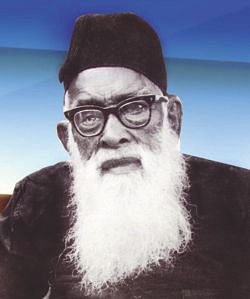The pioneer of Muslim Renaissance in Bengal

THE Bengal Muslim Renaissance refers to a socio-cultural, educational and religious reform movement during the nineteenth and early twentieth century in undivided India's Bengal province. It is said to have begun with Sir Sayed Ahmed (1817-1898). Nawab Abdul Latif (1828-1893) is considered as the architect and Khan Bahadur Ahsanullah (1873-1965) was one of the pioneers of the Renaissance in Bengal.
Khan Bahadur Ahsanullah was a silent revolutionist who played a pioneering role in upgrading Muslim society in undivided Bengal during the British period. He was a renowned educationist, a high government official of Bengal, one of the most enlightened personalities of his time, and a social reformer of undivided Bengal and Assam. He was also a philanthropist, remarkable literary figure, humanitarian philosopher, religious thinker and a spiritual guide to his people. He is known as the founder of Ahsania Mission and considered a great Sufi.
Khan Bahadur Ahsanullah was born in a respectable Muslim family of Nalta Sharif village—under Satkhira district—in December, 1873. He passed the Entrance examination with a scholarship and distinction from the London Missionary School of Bhabanipur, Kolkata in 1890. He passed the F.A. examination with a scholarship from the Hoogli College, Kolkata in 1892. He obtained the B.A. degree in 1894 and M.A. degree in Philosophy from Presidency College under the University of Kolkata in 1895.
After getting the Master degree he joined as a supernumerary teacher at the Rajshahi Collegiate High School in 1896, and became its first Muslim headmaster in 1904. In 1924, he was promoted to the post of the assistant director of education department of undivided Bengal and Assam. He was the first officer from India and also the only Muslim who was selected for that post, and after his retirement no other Indian was appointed to that post. He was a close friend of Sher-e- Bangla A.K. Fazlul Haque and played a very important role in education of Muslims in undivided Bengal.
During his service life (1896-1926) he tremendously reformed education of Muslims. He introduced the system of writing the roll numbers of the students instead of their names in examination papers. In the schools and colleges, he readjusted the ratio of stipends for the Muslim students and made provisions so that increasing number of poor but meritorious students could study free of cost. He was instrumental in establishing many madrasas and Muslim high schools, and the Islamia College for Muslim students in Kolkata. He was actively associated with the establishment of the new-scheme madrasa. He made valuable contributions to the establishment of the Baker Hostel, Taylor Hostel, Carmichael Hostel, Muslim Institute of Kolkata and the Fuller Hostel in Rajshahi. He was elected a member of the Senate and the Syndicate of the Kolkata University.
Ahsanullah was conferred the title of 'Khan Bahadur' by the British government in 1911. He was also elected a member of Royal Society of London the same year. During 1917-1918, he was the vice-president of the Literary Association of the Muslims of Bengal. Ahsanullah was an official member of the Muhammadan Educational Advisory Committee. The Islamic Foundation Bangladesh award was bestowed on him posthumously in 1405 Hizri of the Arabic calendar. Bangla Academy also awarded him an honourary fellowship in 1960 for his valuable contributions in the field of Bengali literature.
Khan Bahadur Ahsanullah had a significant contribution in the formation of the University of Dhaka (1921). After the First World War, the Hornell Committee (special committee to establish Dhaka University) was formed in 1914 and Khan Bahadur Ahsanullah was made a member. The Commission justified the setting up of University of Dhaka. On November 1, 1919, a nine-member senate special committee was formed, and Khan Bahadur Ahsanullah was an important member. It submitted its report along with a note of dissent from Khan Bahadur Ahsanullah, in which he reiterated the reasons for the establishment of the University. Most of the suggestions from Khan Bahadur Ahsanullah were adopted in the Dhaka University Act 1920.
During both his service and retired life, Khan Bahadur Ahsanullah tried his hand at literature and creative writings. He wrote more than one hundred books on Muslim traditions, thoughts on Islam, philosophy of Sufism and various aspects of Islamic history. His book, History of Muslim World, was a recommended book in the syllabus of Oxford University. Now, Sufi is a recommended book in the department of Islamic Studies in University of Dhaka and National University in Bangladesh. In order to encourage writers he established the Makhdumi Library and the Empire Book House at Kolkata.
In 1935, Khan Bahadur Ahsanullah founded a non-political and service-oriented organisation, Ahsania Mission—inspired by Ramakrishna Mission—with its head office at Nalta Sharif, Satkhira. The motto of Ahsania Mission is “Divine and Humanitarian Service.” There are now 138 branches of the Mission at home and abroad. Ahsania Mission is the outward manifestation of Khan Bahadur Ahsanullah's faith and ideals, and reflects the inherent beauty of his being. It is still working to ensure humanity, social welfare, education and spiritual line.
Khan Bahadur Ahsanullah passed away on the February 9, 1965. He was a spiritual leader and his tomb (Pak Rawza Sharif) is in Nalta and is called holy Nalta Sharif. His name and fame, and his contributions will live eternally. He was a great contributor to the upgrading of Muslim education and Muslim society, but at the same time he was a non-communal philosopher.
The Writer is an M. Phil Researcher, University of Dhaka and Office Secretary of Bangladesh Political Science Association.
Email: [email protected]

 For all latest news, follow The Daily Star's Google News channel.
For all latest news, follow The Daily Star's Google News channel. 



Comments